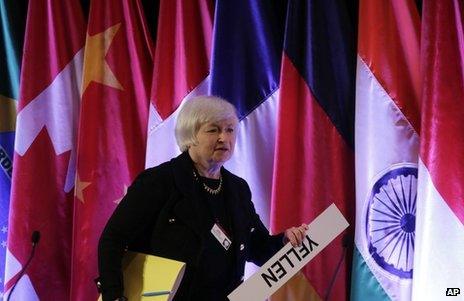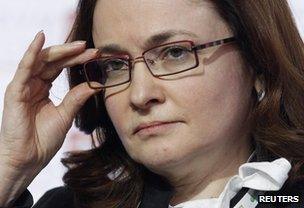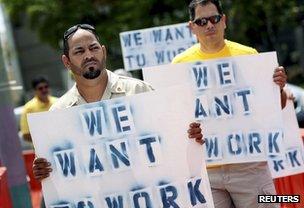Is Janet Yellen the Federal Reserve's 'fall gal'?
- Published
- comments

A Canadian was appointed to run the Bank of England. A woman, Janet Yellen, will be appointed to run the more powerful US Federal Reserve, if President Obama's wish isn't blocked by Congress. Diversity rules in central banking?
About time you might say.
Central banking has been more dominated by white men in suits than any other occupation I can think of. The hegemony of the Y chromosome in monetary policy is greater even than its hold on big business or big politics.
For years I have struggled to understand why this is. What is it about the arcana of the money transmission mechanism that repel women just as they approach the secret chamber where they would have the power to expand or shrink the supply of money?
The men of the Bank of England, showing less than magnificent imagination, always put it down to women going off to have babies just when they're beginning to learn the game, and - a bit of useful self insight here - the Bank being lousy at helping them to reintegrate when they're ready to return.
For what it's worth, the Bank seems to be mending its ways a bit. It invented the post of chief operating office, and appointed Charlotte Hogg as first incumbent.
And Jenny Scott, late of the BBC where she was in charge of comms, is back as an executive director and adviser to the governor on a part-time basis, now that her children are a bit older.
So that is two women out of 16 at the Bank of England's executive top table, which is a 100% increase on recent history and an increase of infinity over tradition (and I am not counting the vacant post of human resources director).
"Well done chaps," you might say. But you might not say "carry on" if you note that the glamorous jobs of governor, deputy governor for monetary policy, deputy governor for financial stability and deputy governor for prudential regulation - the policy making jobs - are all still filled by blokes.

Russia's new central bank chief Elvira Nabiullina
But what on earth could be more glamorous than being chairman of the Federal Reserve. I don't want to be accused of overstating it, but the appointment of Janet Yellen feels like quite a big deal.
It is not quite like having a woman in charge of the Vatican, but it's not far off.
So we've talked about the apparent lack of equal opportunities in the stewardship of our money. What about ideological and intellectual diversity?
Well, for the next year or so at least, Yellen would represent continuity in a policy sense.
She was an architect and supporter of the plan to create $85bn of new money a month to keep interest rates as low as possible in the hope of bringing down unemployment.
So there'll be no charge back to tight-money, anti-inflationary zeal on her watch - or at least not until the risks of self-reinforcing price rises are impossible to ignore.
And here is where you have to worry that she's being lined up as the "fall gal" (I don't think that's a sexist descriptor, but I am counting on you to put me right).
Because phasing out the extraordinary, exceptional attempts to reduce the cost of money - the hallmark of the central banks of the major rich economies since the crash of 2008 - is fraught with dangers.
Just the hint that the Federal Reserve would reduce that $85bn a month of money creation via bond purchases has pushed up important US and overseas interest rates and caused turmoil on currency markets.
If that is the impact of just the possibility of a slight turning down of the money faucet, what kind of market reaction is likely as and when the valve is tightened?
Maybe with investors' expectations ahead of events, it will be a non-event. But the current Fed chair Ben Bernanke and his colleagues, bar one (who wasn't Ms Yellen), haven't been ready to bet on that.
They worry that interest rates will overshoot in an upward direction, and choke off America's fledgling recovery.
And another thing.

Federal workers have been sent home in the shutdown
Ms Yellen would be picking up the pieces of the current inability of Congress to agree a new budget.
With no end in sight to the partial shutdown of the US Federal government, and fears rising of that most momentous of accidents, a default by the United States (see Onset of the storm), at best she'll inherit an economy weaker than she would have hoped just a couple of weeks ago. At worst she'll be cleaning up a financial crisis not too different from the 2008 debacle.
Which means, as minimum, extraordinary money manufacturing would persist for longer.
Just to state the most basic challenge for her, the longer the US and global economy is hooked on massive money creation by the Fed, the harder will be the cold turkey, as and when it comes.
And, to repeat the bloomin' obvious, because of the budget impasse, it looks like US addiction to cheap money will be fed for some time yet.
Or to put it another way, if Congress ratifies her appointment, Ms Yellen will have to make history in a bigger sense than simply being the first woman to be seen as the most powerful financial player in the world. She'll also have to navigate all of us (and I mean all of us) through some of the most treacherous economic rocks we're ever likely to encounter.